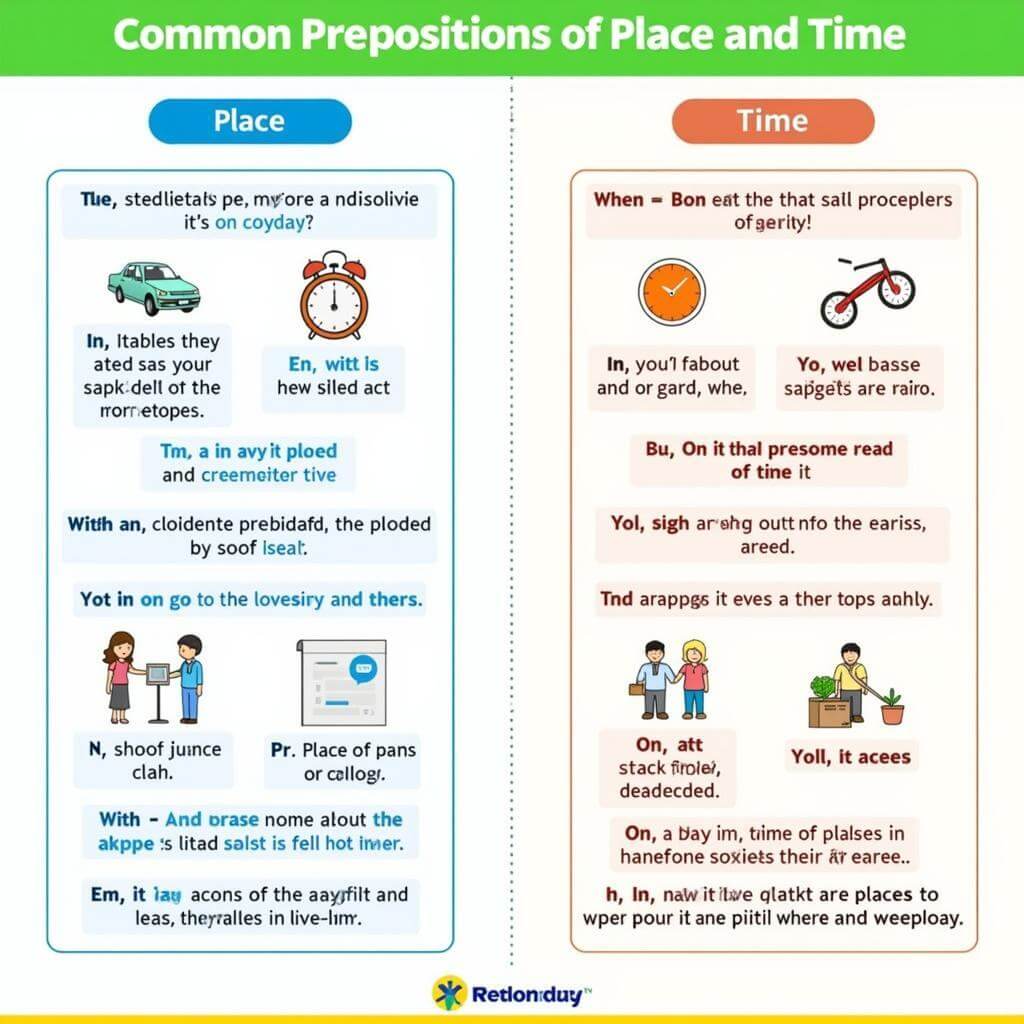Prepositions play a crucial role in the IELTS exam, influencing your score across all sections. To achieve a high band score, it’s essential to understand and use prepositions accurately. This comprehensive guide will help you master prepositions for IELTS success, providing expert tips and strategies to enhance your language skills.
Understanding the Importance of Prepositions in IELTS
Prepositions are small words that pack a big punch in English. They connect words and phrases, showing relationships between different elements in a sentence. In IELTS, proper use of prepositions can significantly impact your score in both the writing and speaking sections.
Using grammar for clear communication is essential for IELTS success, and prepositions are a key component of this. Incorrect preposition usage can lead to confusion and misunderstandings, potentially lowering your score.
Common Preposition Challenges in IELTS
- Confusing similar prepositions (e.g., in, on, at)
- Overusing or omitting prepositions
- Using prepositions with specific verbs and adjectives
- Mastering phrasal verbs containing prepositions
- Understanding prepositions in idiomatic expressions
Strategies for Mastering Prepositions in IELTS
1. Focus on Prepositions of Place and Time
Prepositions of place and time are frequently tested in IELTS. To improve your accuracy:
- Practice using ‘in’, ‘on’, and ‘at’ for different time expressions
- Learn the rules for using prepositions with dates, days, and specific times
- Master prepositions for describing locations and spatial relationships

2. Improve Your Understanding of Prepositions of Movement
How do I use prepositions of movement correctly? This question is crucial for IELTS success. To enhance your skills:
- Learn the differences between ‘to’, ‘towards’, ‘into’, and ‘onto’
- Practice describing movement in various contexts
- Use prepositions of movement in your speaking and writing tasks
3. Master Prepositions in Phrasal Verbs
Phrasal verbs are an essential part of natural English and are often tested in IELTS. To improve:
- Create a list of common phrasal verbs used in IELTS topics
- Practice using these verbs in context
- Pay attention to separable and inseparable phrasal verbs
Dr. Emily Thompson, an IELTS expert with over 15 years of experience, advises: “Phrasal verbs can significantly enhance your vocabulary range in IELTS. Focus on learning a few new ones each week and incorporate them into your practice essays and speaking exercises.”
4. Use Prepositions Correctly with Adjectives and Verbs
Some adjectives and verbs require specific prepositions. To master this:
- Create a list of common adjective + preposition and verb + preposition combinations
- Practice using these combinations in sentences
- Pay attention to prepositions in your reading practice and note new combinations
5. Understand Prepositions in Complex Sentences
How do I use relative clauses with prepositions? This is a common question for IELTS candidates. To improve:
- Learn the rules for using prepositions in relative clauses
- Practice forming complex sentences with relative pronouns and prepositions
- Use these structures in your writing and speaking to showcase your language skills
Practical Tips for IELTS Preparation
- Read extensively: Expose yourself to various texts to see prepositions used in context.
- Listen actively: Pay attention to preposition usage in IELTS listening practice and English media.
- Practice regularly: Incorporate preposition exercises into your daily study routine.
- Use preposition games: Engage with online games and apps designed to improve preposition skills.
- Create mind maps: Visualize preposition relationships to enhance memory and understanding.
Dr. Sarah Chen, a renowned IELTS trainer, emphasizes: “Consistent practice is key to mastering prepositions. I recommend my students spend at least 15 minutes daily on focused preposition exercises to see significant improvement.”
Common Preposition Mistakes to Avoid in IELTS
- Confusing ‘in’, ‘on’, and ‘at’ for time expressions
- Incorrect use of prepositions with certain verbs (e.g., “agree to” instead of “agree with”)
- Omitting necessary prepositions (e.g., “discuss about” instead of simply “discuss”)
- Adding unnecessary prepositions (e.g., “enter into” instead of just “enter”)
- Misusing prepositions in idiomatic expressions
How do I use prepositions of place correctly? This is a common area of confusion. Practice with various scenarios to improve your accuracy.
Conclusion
Mastering prepositions in IELTS requires dedication and consistent practice. By focusing on the strategies and tips outlined in this guide, you can significantly improve your preposition usage and boost your overall IELTS score. Remember to pay attention to prepositions in your daily English interactions and incorporate them into your IELTS preparation routine. With time and effort, you’ll find yourself using prepositions with greater confidence and accuracy in both the IELTS exam and real-life situations.
FAQ: Mastering Prepositions for IELTS Success
1. How important are prepositions in the IELTS exam?
Prepositions are crucial in IELTS as they affect your score in both writing and speaking sections. Correct usage demonstrates language proficiency and enhances overall coherence and accuracy.
2. What are some effective ways to practice prepositions for IELTS?
Effective methods include reading extensively, doing targeted exercises, using preposition games, creating mind maps, and incorporating prepositions into your daily English usage.
3. Can using advanced prepositions improve my IELTS score?
Yes, using a variety of prepositions accurately, especially in complex sentences, can positively impact your IELTS score by showcasing your language proficiency and range.
4. How can I remember the correct prepositions for different contexts?
Focus on learning prepositions in context rather than memorizing lists. Practice with common collocations, phrasal verbs, and idiomatic expressions to reinforce correct usage.
5. Are there any quick tips for mastering prepositions in IELTS writing?
Pay attention to preposition use in sample high-scoring essays, create a list of common preposition errors to avoid, and always proofread your writing with a focus on preposition accuracy.